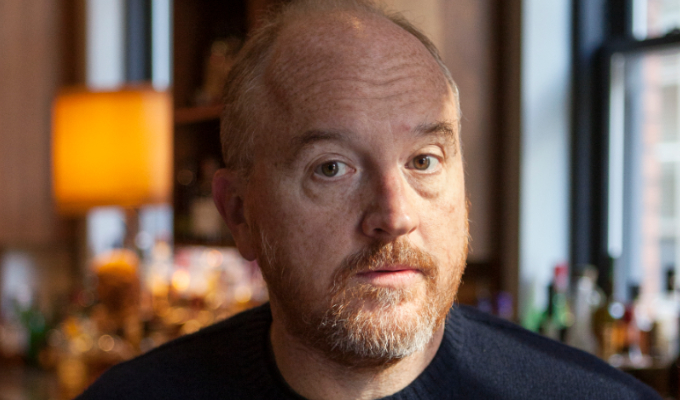 © Angela Lewis for The New York Times
© Angela Lewis for The New York Times Sorry/Not Sorry
Review of the New York Times film about Louis CK's sexual misconduct
Towards the end of Sorry/Not Sorry, the documentary about Louis CK's sexual harassment of female comedians, Mike Schur, co-creator of Parks and Recreation, suggests that the term 'cancel culture' is 'reductive, stupid and misused and applied to a lot of people who have flourishing careers'.
What's particularly disheartening about this film is just how accurate that seems.
Regardless of the impact of CK's actions on his victims and his right or otherwise to continue performing, the coarsening of the debate around ‘cancellation' ensures that answering the questions raised by Sorry/Not Sorry seems further beyond us than ever.
Made by The New York Times, which first exposed the industry’s open secret of CK’s predilection for masturbating in front of women, this documentary feels important, not least given the recent allegations of sexual assault made against – and denied by – Russell Brand.
No one is equating CK's crimes with those levelled at the British comedian. But there are striking parallels in how and why the rumours took so long to reach wider attention, the power that top male comics wield, the degrees to which they're excused and indulge, and how much of comedy is conditioned to perpetuate their worst behaviour.
No Weinstein nor Cosby, CK copped to his actions and confirmed his victims' accounts, albeit only when he was incontrovertibly exposed (and he decline to get involved in this film)
His recent ticket sales and Grammy-winning success suggest that he's still commercially viable, perhaps even artistically redeemable. Yet several of those spoken to feel his apologies fall short and indeed, are beneath a comic once hailed for baring his darkest and most disgusting thoughts, but who now refuses to fully confront them.
Polished and methodical, split into seven parts and with a broad array of interviewees, directors Cara Mones and Caroline Suh have made a film that's relevant and pressing, but which has spread itself rather too thin.
With the benefit of hindsight about CK, the first part of the documentary is probably the most watchable, as fellow comics and critics line up to establish how he built a persona that not only hid his depravity in plain sight but earned him huge love for his failings. Many are his peers and sometime enablers, former fans and continued fans who ruefully admit that they didn't wish to see what was right in front of their eyes.
Of everyone featured, Jon Stewart especially, in archived footage, goes on a real journey of having the scales fall from his eyes. There's excruciatingly uncomfortable footage of him blithely dismissing the rumours against CK as Twitter-tattle to a nervous student going out of his way to respectfully ask what he knows.
The film hinges upon, and rightly foregrounds, the testimony of three of CK's victims. The stand-up Jen Kirkman, who is painstakingly detailed and vivid in the cost to her on every conceivable level of outing CK (without naming him) on her podcast in 2015; the performer and artist Abby Schachner, who, after relating how CK masturbated on the phone to her, found herself mocked by Dave Chappelle for a having a 'brittle-ass spirit'; and the stand-up and journalist Megan Koester, below, whose challenging of the industry code of overlooking CK's toxicity, earned her the furious enmity of the Just For Laughs Festival.

CK used them all with the false implication of seeking to help their careers. And through the influence of his powerful former manager, Dave Becky, he blocked others from achieving their potential. Touchingly, Schachner is shown reframing the abuse she attracted from Chappelle's intervention into a modest go at stand-up. But it's with real feeling that she protests that 'this is going to be in my fucking obituary’.
The film effectively takes its title from CK's 2021 special Sorry, in which he tries to reclaim his actions as a sexual kink and himself as a victim too, which Kirkman for one, is absolutely not having.
Even more staggering is to be reminded of his 2017 film, I Love You Daddy, about the relationship between a teenage girl and a 69-year-old artist, starring Chloe Moretz and John Malkovich, which features a character wantonly masturbating in front of others. Tig Notaro, who with Pamela Adlon was one of the female comic voices he championed (as a distraction?) while the rumours were really swirling, got her revenge after she'd talked to Kirkman, by including a similar scene in her television comedy One Mississippi.
The likes of Joe Rogan and Bert Kreischer are shown heartily welcoming CK back into the comedy fold as he prepares to play Madison Square Garden last year. And there's a sense that CK is now attracting fresh fans as a bizarre sort of free speech martyr.
But the often thoughtful Michael Ian Black, who once made the mistake of tweeting about the possibility of affording him a second chance, laments CK's material now, describing it a 'missed opportunity' to confront what really happened.
Koester damns him: 'He came back, he learned nothing. He didn't say anything profound about the experience.’
Others continue to wrestle with their consciences. Between initially casting CK as Leslie Knope's love interest in Parks and Rec to inviting him back for later series, Schur heard the rumours and recounts the mental gymnastics he contrived to convince himself that it wasn't his problem, versions of which many of us will have done when trying to justify, excuse or ignore our favourite artists' misdemeanours.
Put on the spot, Stewart simply has no answers to what he would have done if he'd known. Sorry/Not Sorry asks an abundance of thorny questions about how we ought to treat CK and similar cases. And, quite wisely, it doesn't try to offer a pat or one-size-fits-all response.
• Sorry/Not Sorry was screened at the Glasgow Film Festival this evening.
Review date: 8 Mar 2024
Reviewed by: Jay Richardson









